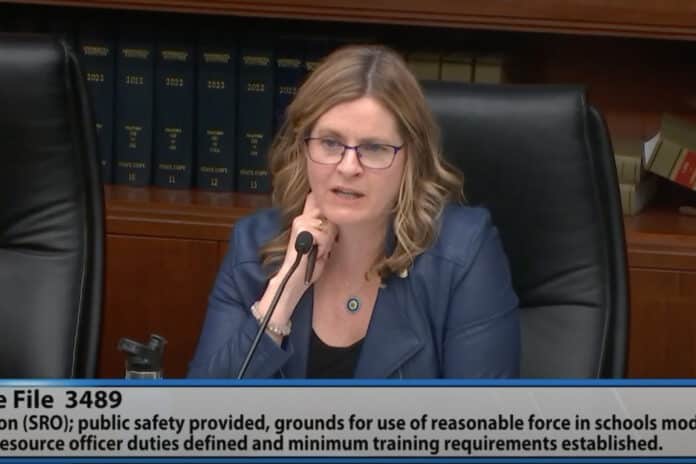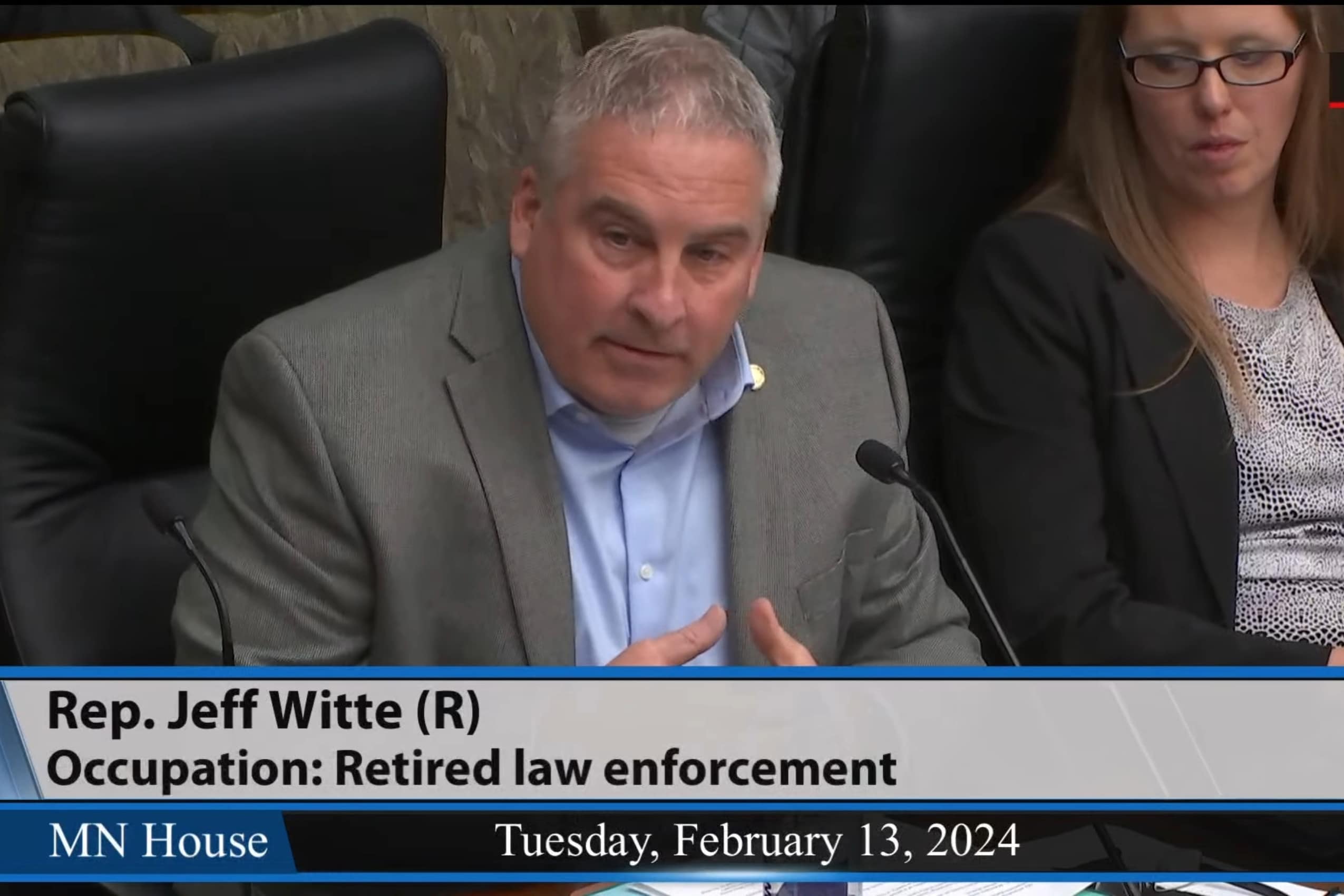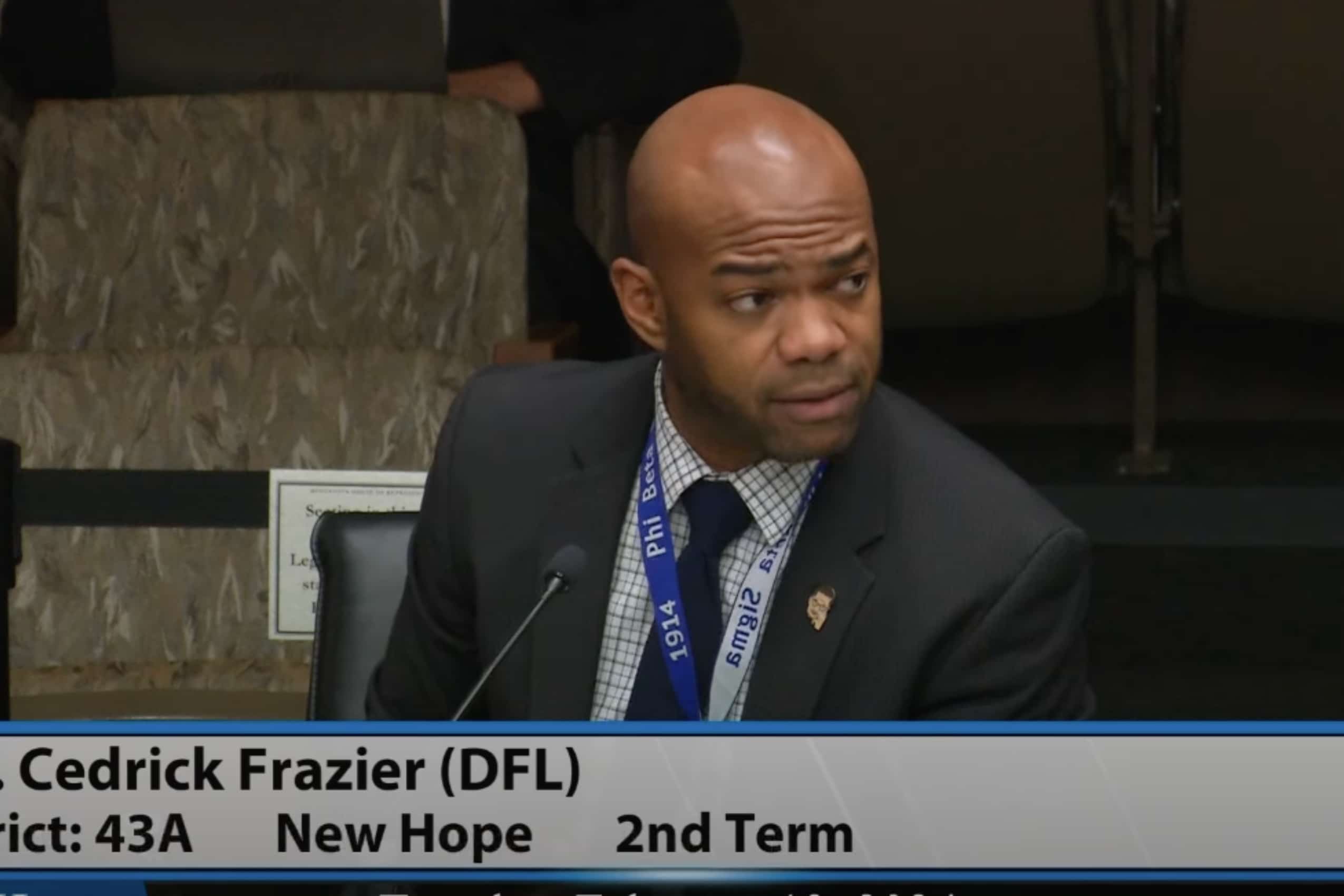
A proposed fix to a 2023 law that many law enforcement industry leaders across Minnesota say has created legal ambiguities for school resource officers on whether they can apply certain types of restraints in schools appears to have lost momentum after two hearings this week in the state House.
Just two days into the 2024 legislative session DFL and Republican lawmakers are debating what that final bill might look like and what kind of impact it will have on school districts across Minnesota who employ the use of SROs in their buildings.
It comes six months after several law enforcement agencies announced they were pulling their SROs from schools.
On Tuesday evening, Rep. Kelly Moller, DFL-Shoreview, who chairs the House Public Safety Committee, announced the bill, HF3489, wouldn’t receive a committee vote necessary to move it along on a trajectory that could have placed it on the House floor in some form before the end of this week.
That decision came as Republicans expressed concern over a provision of the bill, which would require creation of a model policy for school resource officers (SROs), to be led by the Peace Officer Standards and Training (POST) Board.
“What this bill does is it takes the language out of statute that provides two different standards for use of force for law enforcement, takes it out of the hands of this body — the legislature — and it puts it in the purview of the POST Board,” said Rep. Walter Hudson, R-Albertville, during the Tuesday hearing. “If you think there is a separate standard that ought to be imposed in public schools, you are going to get your opportunity, it just won’t be here in a public forum, as part of the legislative process. All you are going to have to do is influence your activist friends who have been appointed by the governor to the POST Board.”
Republicans in the House Public Safety Committee unsuccessfully offered an amendment to strike that language from the bill and instead add language that would have the Department of Public Safety’s School Safety Center write SRO training requirements school districts and law enforcement agencies utilize. That amendment, which was also voted down in a separate committee hearing on Monday, contains three other tweaks that law enforcement associations have advocated for.
“It’s disappointing that after months of ignoring bipartisan calls for a fix to the (SRO) law, Democrats have once again delayed returning our SROs back to their posts,” wrote Reps. Jeff Witte, R-Lakeville, and Paul Novotny, R-Elk River, in a joint statement following the Tuesday evening hearing.

Both Novotny and Witte have career background as police officers and said they know Democrats who aim to get some version of an SRO fix bill passed this session will need Republican votes and input.
That followed a Monday hearing, where Democrats in the House Education Policy Committee voted along party lines in support of HF3489. Bill sponsor Rep. Cedrick Frazier, DFL-New Hope, says his proposal takes into consideration a wide range of voices involved in ensuring schools are safe for students and staff, without jeopardizing the ability of school resource offices to do their jobs.
“We are not far removed from the tragic murder of George Floyd, and in the wake of Floyd’s murder, this Legislature passed bipartisan legislation to avoid a repeat of that tragedy,” Frazier said, attempting to provide context for the 2023 law and his proposed tweak to the legislation to provide more legal clarity for school administrators and law enforcement officials. “Our only focus must be doing everything we can to ensure that when our young people are in our schools that we ensure that their environment is safe from any type of harm.”
Republicans support some components of bill, criticize others
While House Republicans have said they support many components of Frazier’s bill, they voted against it in both the Education and Public Safety committees after Democrats voted down a GOP amendment.
Frazier’s bill proposes to create a model policy for SROs that would be developed by the POST Board in consultation with:
- The Department of Public Safety’s School Safety Center
- The Minnesota School Boards Association
- The Minnesota Association of Secondary School Principals
- Education Minnesota
- The Minnesota Sheriffs’ Association
- The Minnesota Chiefs of Police Association
- The Minnesota Police and Peace Officers Association
- Juvenile Officers Association
- Solutions Not Suspensions
- The Minnesota Youth Council
- At least one community organization supporting the rights of special education students
That policy must be created by June 1, 2025, which didn’t sit well with Rep. Ben Bakeberg, R-Jordan, who said the limitation of stakeholders who could help create the policy and the deadline for its creation was suspect.
“What I was told by some of my constituents, they said, ‘You know, Ben, that kicks the can down the road long enough that just gets us past the election, that is very convenient,’” Bakeberg, a public school principal, said during a Monday hearing on the bill in the House Education Policy Committee.
The model policy must consider the “proper use of force on school grounds, including response tactics and strategies that minimize the use of prone restraint,” according to bill language.
An identical version of the bill is being carried by Sen. Bonnie Westlin, DFL-Plymouth, in the Senate and its set for its first committee hearing on Wednesday.
On the House floor Monday Republicans stressed the need for a version of the bill that’s palatable to law enforcement agencies and education industry associations to be passed quickly.
DFL legislator: students of color feel ‘overpoliced’ in schools, compares to prison
While a handful of testifiers on the bill on Monday and Tuesday included representatives from various education and law enforcement industry associations and the commissioners of public safety and education, who spoke to the technical impacts of the bill, a number of critics of the proposed legislation said they have genuine fear any rollback of the 2023 legislation would harm the safety and emotional wellbeing of certain student populations.

“This (legislation) is not about whether SROs belong in schools; it’s about whether we believe holds that kill children belong in school,” said Matt Shaver of EdAllies, a non-profit organization that opposes any rollback of the 2023 legislation.
Ali Allowonle, a youth advocate for Education for Liberation Minnesota, told legislators restraint holds that SROs use disproportionately impact “black, brown and indigenous students.”
The bill would give the Department of Public Safety and Department of Education tools to begin collecting data on incidents involving school resource officers using restraint holds on students.
But one legislator, Rep. Heather Keeler, DFL-Moorhead, said those provisions don’t go far enough in a school environment where she said many students of color feel “overpoliced.” She expressed dismay that no data has been collected on use of force in schools by state agencies to date.
Keeler also said she wants to see a requirement that school resource officers wear plain clothes, not full uniforms that she said many students fear because of the “prison-style” “power dynamic” it symbolizes.
“You are really privileged if you don’t think [use of force incidents are] happening in our schools, because I can tell you it has,” said Keeler, who works as an American Indian education liaison. “And if you have not sat with parents or kids or families that have gone through this in our school settings, it’s horrific.”
Rep. Peggy Bennett, R-Albert Lea, said she believes the lack of data on use of physical restraints in schools, coupled with incendiary rhetoric from some who oppose a fix to the 2023 law, has created a false impression of what is happening in Minnesota schools.
“Unfortunately, that’s created an image of teachers and school resource officers who are intentionally choking and physically harming children,” Bennett said.
Hank Long
Hank Long is a journalism and communications professional whose writing career includes coverage of the Minnesota legislature, city and county governments and the commercial real estate industry. Hank received his undergraduate degree at the University of Minnesota, where he studied journalism, and his law degree at the University of St. Thomas. The Minnesota native lives in the Twin Cities with his wife and four children. His dream is to be around when the Vikings win the Super Bowl.












